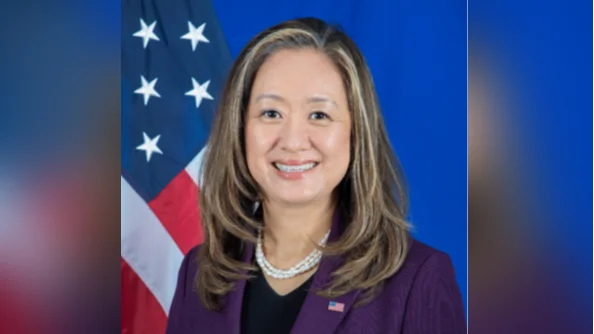At the closing ceremony of Pacific Angel (PACANGEL) 2025 in Katunayake, Sri Lanka, Ambassador Julie Chung addressed participants from Sri Lanka, the United States, Australia, Bangladesh, Japan, and Maldives. The event marked the end of Sri Lanka’s largest multilateral exercise for the year and highlighted continued cooperation among Indo-Pacific partners.
Ambassador Chung noted the importance of disaster response training and international cooperation. She referenced a recent incident where the Sri Lankan Air Force responded to a bus crash on the Ella–Wellawaya road as an example of preparedness in action.
“It is an honor to join you today for this important training on disaster response. We all know that preparedness and cooperation are the keys to saving lives when crises strike. Just last weekend, the Sri Lanka Air Force deployed two helicopters to aid in the rescue of victims from a tragic bus crash on the Ella–Wellawaya road. It is a powerful reminder that disasters and emergencies can strike anywhere, at any time. I want to commend the SLAF for their swift response and lifesaving assistance. That same spirit of readiness and service is what brings us together here today.”
Chung also emphasized how PACANGEL fosters both military readiness and cultural ties among nations.
“From ports to people, Indo-Pacific ties connect our futures. PACANGEL is not only about military readiness but also about people-to-people bonds. The U.S. Air Force Band performed shoulder-to-shoulder with the Sri Lanka Air Force Band, showing how music bridges cultures. Our engineers worked together on projects that improve communities, demonstrating that practical cooperation strengthens the foundation of our partnerships.”
She outlined key components of this year’s exercise:
“What we build together today is a foundation for tomorrow’s shared security.
This year’s PACANGEL strengthened readiness through C-130 operations, search-and-rescue training, and eight subject matter expert exchanges — from jungle survival and maritime surveillance to medical response, cargo handling, and mass casualty management. Each of these exchanges built the skills and resilience needed for faster, stronger responses to future crises.”
The ambassador thanked various U.S. units involved:
“Thank you to the U.S. Pacific Air Forces and the Montana National Guard for showcasing American military excellence in this week’s exercise. PACANGEL 25 was supported by two U.S. C-130J aircraft alongside Sri Lanka’s Bell 412, B-212 helicopters, and King Air 350. Together, these assets showcased how each nation contributes its unique strengths, sharing responsibility and reinforcing trust through cooperation. That is the essence of true partnership.”
She stressed regional collaboration as vital for security:
“Together, we safeguard security and open commerce. Natural disasters, humanitarian crises, and modern challenges do not stop at borders. By coming together — Australia, Bangladesh, Japan, Maldives, Sri Lanka, and the United States — we build the interoperability and readiness to protect lives and ensure open commerce. What happens in the Indo-Pacific shapes the entire globe, and PACANGEL shows how our collective efforts safeguard peace and stability for all.”
Chung concluded by reflecting on how much PACANGEL has grown since its inception:
“PACANGEL has grown enormously since the first exercise in Sri Lanka in 2010 with just two other countries — Maldives and Mongolia. Today, the scale and impact of PACANGEL 25 demonstrate how far our cooperation has advanced. We are stronger, safer, and more prosperous when we stand shoulder-to-shoulder.
As we close this chapter let us carry forward the lessons learned ,the relationships built ,and trust we cultivated this week .I look forward to future of PACANGEL ,and enduring strength our partnership .”

